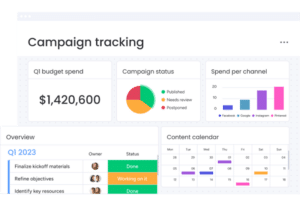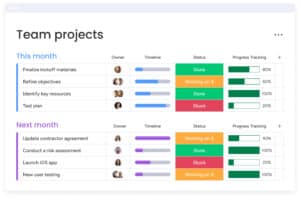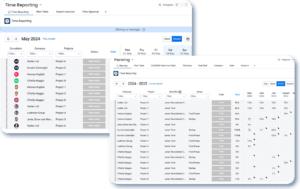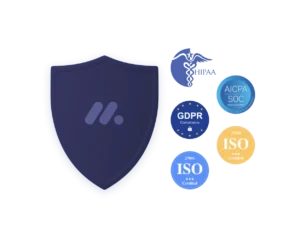Introduction to Event Marketing and Management
Event marketing and management are crucial components in the modern marketing landscape, helping businesses to enhance brand visibility and engage with their target audience more effectively. Understanding the intricacies of how to use monday.com for effective event marketing and management can significantly streamline these processes. It can make your events not only successful but also memorable.
What is Event Marketing?
Event marketing involves planning, organizing, and executing events as a strategy to promote a brand, product, or service. These events can range from large-scale trade shows and conferences to smaller, more intimate gatherings like webinars or product launches. The primary goal is to create unique experiences that foster direct interactions between the brand and its audience, driving brand awareness, lead generation, and customer loyalty.
Utilising tools like monday.com for effective event marketing and management allows marketers to meticulously plan every aspect of their event, ensuring that no detail is overlooked. From setting up pre-event promotions to managing post-event follow-ups, monday.com provides a robust platform to handle it all.
Challenges in Event Management
Event management involves juggling numerous tasks, often under tight deadlines. Some common challenges include:
- Coordinating with multiple stakeholders: Managing communication and collaboration among various team members, vendors, and participants can be complex.
- Keeping track of details: With numerous tasks and deadlines, it’s easy to miss out on important details.
- Managing budgets: Ensuring that the event stays within budget while delivering high quality can be daunting.
- Ensuring attendee satisfaction: Creating a seamless experience for attendees from registration to post-event follow-up is critical for success.
Knowing how to use monday.com for effective event marketing and management can help overcome these challenges by providing a centralised platform to manage all event-related activities. monday.com’s features like task assignment, timeline tracking, and budget management tools ensure that every aspect of your event is meticulously planned and executed.
Mastering how to use monday.com for effective event marketing and management is essential for any business looking to leverage events as a powerful marketing tool. By addressing the common challenges in event management with a comprehensive platform like monday.com, you can create successful events that resonate with your audience and achieve your marketing goals.
Why Choose monday.com for Event Marketing and Management?
When it comes to organising successful events, knowing how to use monday.com for effective event marketing and management can make all the difference. This powerful Work Operating System (Work OS) is designed to streamline workflows, enhance collaboration, and simplify complex processes, making it an ideal choice for event planning and execution.
Overview of monday.com
monday.com is a versatile Work OS that allows teams to build custom workflows for any project or process. With its highly visual and user-friendly interface, monday.com provides a centralised hub where all team members can collaborate, share updates, and monitor progress in real-time. This flexibility makes it perfect for managing the multifaceted aspects of event marketing and management.
For those learning how to use monday.com for effective event marketing and management, the platform offers a range of features tailored to meet the unique demands of event planning. From customisable templates to robust reporting tools, monday.com equips event marketers with everything they need to ensure their events run smoothly and successfully.
Advantages of Using monday.com
There are several compelling reasons to choose monday.com for event marketing and management:
- Enhanced Collaboration and Communication
- monday.com facilitates seamless communication among team members, vendors, and stakeholders. With features like real-time updates, comments, and file sharing, everyone stays informed and connected, reducing the risk of miscommunication and errors. Additionally, with monday.com’s access settings, you can make sure that both internal and external stakeholders only have access to the material relevant to them.
- Customisable Workflows and Templates
- One of the key advantages of knowing how to use monday.com for effective event marketing and management is the ability to create custom workflows that fit your specific needs. The platform offers a variety of features relevant to event planning. You can create boards which can be tailored to include all necessary tasks, deadlines, and dependencies for your event marketing and management.
- Integration with Other Marketing Tools
- monday.com integrates seamlessly with other essential marketing tools, such as email marketing platforms and social media platforms. This integration ensures that all your event marketing activities are coordinated and tracked in one place, providing a comprehensive view of your efforts.
Omnitas Newsletter
Sign up for our monthly newsletter to stay up-to-date on our latest blog articles, videos and events!
Thank you!
You have successfully joined our subscriber list.
Setting Up Your Event Management Workflow in monday.com
Knowing how to use monday.com for effective event marketing and management starts with setting up a robust event management workflow. This section will guide you through the essential steps to create and customise your workflow, ensuring that your event planning process is efficient, organised, and tailored to your specific needs.
Step 1: Creating a Project Board
The first step in setting up your event management workflow in monday.com is to create a project board. This board will serve as the central hub for all your event-related tasks and information.
- Setting Up a New Board
- Start by creating a new board in monday.com. You can choose from a variety of templates specifically designed for event management, or you can create a custom board from scratch.
- Customising Columns and Fields
- Customise the columns to include all the necessary fields for your event. Common columns might include task name, assignee, due date, status, priority, and notes. For more detailed tracking, you can add columns for budget, vendor details, and other specific information relevant to your event.
Creating a well-structured project board is a critical first step in understanding how to use monday.com for effective event marketing and management. This board will help you visualise all the moving parts of your event and ensure that everything is accounted for.
Step 2: Defining Milestones and Timelines
With your project board set up the next step in using monday.com for effective event marketing and management is to define clear milestones and timelines. This helps keep your event planning on track and ensures that all critical tasks are completed on time.
- Adding Key Event Milestones
- Identify and list out all major milestones for your event. These could include dates for initial planning meetings, vendor booking deadlines, marketing campaign launches, and rehearsal dates. Each milestone should be clearly defined and visible on your project board.
- Setting Up Deadlines and Reminders
- Assign deadlines to each task and milestone. Using monday.com’s timeline view, you can easily visualise these deadlines and see how tasks overlap. Set up automated reminders to ensure that no deadline is missed. This feature is particularly useful for keeping team members accountable and on schedule.
By defining milestones and timelines, you gain a clear roadmap of your event, which is crucial for effective event marketing and management.
Step 3: Assigning Roles and Responsibilities
A successful event requires a coordinated effort from all team members. Knowing how to use monday.com for effective event marketing and management involves assigning clear roles and responsibilities to ensure everyone knows what they need to do.
- Assigning Team Members to Specific Tasks
- Use the assignee column to allocate tasks to specific team members. This not only clarifies who is responsible for what but also helps in monitoring workload and ensuring that tasks are evenly distributed.
- Utilising the Workload View
- The workload view in monday.com allows you to see how tasks are distributed across your team. This helps in balancing workloads and ensuring that no team member is overburdened. Adjust assignments as necessary to maintain a balanced and efficient team.
Step 4: Managing Event Logistics
Effective event marketing and management extend beyond just planning; it involves managing all logistical aspects of the event.
- Tracking Venue Bookings and Vendor Contracts
- Use monday.com to keep track of venue bookings, vendor contracts, and other logistical details. Create a dedicated section on your project board for these tasks, ensuring that all information is easily accessible and up-to-date.
- Managing Budgets and Expenses
- Add columns to track budgets and expenses for various aspects of your event. This helps in monitoring spending and ensuring that you stay within budget. monday.com’s reporting tools can also generate financial reports, providing a clear overview of your event’s financial status.
Step 5: Monitoring Progress and Making Adjustments
Continuous monitoring and the ability to make adjustments are key components of effective event marketing and management using monday.com.
- Real-Time Task Updates
- With monday.com’s real-time updates, you can monitor the progress of each task as it happens. This allows you to identify any potential issues early and address them promptly.
- Adjusting Plans Based on Feedback
- Use feedback from team members and stakeholders to make necessary adjustments to your event plan. monday.com’s flexibility allows you to easily modify tasks, timelines, and assignments as needed.
In conclusion, setting up your event management workflow in monday.com is a systematic process that involves creating a detailed project board, defining milestones and timelines, assigning roles and responsibilities, managing logistics, and continuously monitoring progress. By mastering how to use monday.com for effective event marketing and management, you can ensure that your event is well-organised, on track, and poised for success.
Managing Event Marketing Campaigns with monday.com
Effectively managing event marketing campaigns is crucial for ensuring high attendance and engagement. Knowing how to use monday.com for effective event marketing and management allows you to streamline and optimise your marketing efforts. This section will explore how to plan your marketing strategy, manage content creation, and track marketing performance using monday.com.
Planning Your Marketing Strategy
A well-thought-out marketing strategy sets the foundation for a successful event. monday.com offers tools to help you outline and execute your marketing plan efficiently.
- Outlining Marketing Goals and KPIs
- Begin by defining clear marketing goals and key performance indicators (KPIs) for your event. These might include registration targets, social media engagement rates, or email open rates. Create a dedicated section on your project board to list these goals and track their progress.
- Creating a Marketing Timeline
- Develop a comprehensive timeline for your marketing activities. Use monday.com’s timeline view to schedule key marketing actions, such as announcement dates, promotional campaigns, and reminder emails. This visual timeline helps ensure that all marketing efforts are well-coordinated and executed on schedule.
Content Creation and Scheduling
Creating and scheduling content is a vital part of any event marketing campaign. monday.com provides features that simplify the management of content production and distribution.
- Using monday.com to Manage Content Production
- Set up a content calendar on your project board to manage the creation of blog posts, social media updates, email newsletters, and other promotional materials. Assign tasks to your content creators, set deadlines, and track progress to ensure timely delivery.
- Scheduling Social Media Posts and Email Campaigns
- Integrate monday.com with your social media and email marketing tools to schedule posts and campaigns directly from the platform. This integration allows you to plan your content distribution strategy and monitor its execution without switching between different tools.
Tracking Marketing Performance
Monitoring the effectiveness of your marketing campaigns is essential for continuous improvement. Robust tracking and reporting help you stay on top of your campaign performance.
- Monitoring Metrics and KPIs in Real-Time
- Use monday.com to track important metrics and KPIs in real-time. Create dashboards that display data such as registration numbers and social media engagement. These insights allow you to measure the impact of your marketing efforts and make informed decisions.
- Adjusting Strategies Based on Performance Data
- Analyse the performance data to identify which strategies are working and which need adjustment. monday.com’s flexible platform allows you to quickly modify your marketing plan based on real-time feedback and performance results.
By effectively managing your event marketing campaigns with monday.com, you can ensure that your promotional efforts are well-organised, timely, and impactful. This approach not only helps in attracting a larger audience but also enhances engagement and overall event success.
In conclusion, knowing how to use monday.com for effective event marketing and management involves strategic planning, efficient content management, and continuous performance tracking. By leveraging these capabilities, you can create and execute a successful marketing campaign that drives attendance and engagement for your event.
Coordinating Event Logistics with monday.com
Effective event logistics coordination is crucial for ensuring that your event runs smoothly. Knowing how to use monday.com for effective event marketing and management allows you to streamline logistical tasks, manage resources efficiently, and maintain clear communication with all involved parties. This section will guide you through the essential steps for managing event logistics using monday.com.
Venue and Vendor Management
Coordinating with venues and vendors is a fundamental aspect of event logistics. monday.com offers features that help you track and manage these critical relationships seamlessly.
- Tracking Venue Bookings and Vendor Contracts
- Create a dedicated board for venue and vendor management. Use columns to track key details such as booking dates, contract terms, contact information, and payment schedules. This ensures that all important information is organised and easily accessible.
- Managing Budgets and Expenses
- Add budget and expense tracking to your board. Monitor costs associated with venues, vendors, and other logistical elements to ensure you stay within your budget. With monday.com’s dashboards, you can generate financial summaries, giving you a clear view of your spending.
Attendee Management
Managing attendees is another critical component of event logistics. With monday.com, you can handle registrations, communications, and other attendee-related tasks efficiently.
- Registration and Ticketing Integration
- Use monday.com forms for your event registrations to get attendee data directly into your project board, keeping all information in one place. Use this data to monitor registration numbers and manage ticket sales.
- Communicating with Attendees through Automated Workflows
- Set up automated workflows to handle attendee communications. For example, you can automate confirmation emails, reminder messages, and follow-up surveys. This not only saves time but also ensures consistent and timely communication with your attendees.
On-the-Day Coordination
Ensuring smooth operations on the day of the event is vital. monday.com’s real-time capabilities help you stay organised and responsive to any last-minute changes or issues.
- Using the Mobile App for On-Site Management
- The monday.com mobile app is an excellent tool for on-site event management. You can check task statuses, communicate with team members, and make necessary adjustments on the go. This flexibility helps you manage the event more effectively and respond quickly to any unforeseen circumstances.
In conclusion, coordinating event logistics with monday.com involves meticulous planning, effective communication, and real-time management. By mastering how to use monday.com for effective event marketing and management, you can ensure that all logistical aspects of your event are well-organised and executed flawlessly. This comprehensive approach enhances the efficiency of your event operations. Additionally, it contributes to a seamless and successful event experience for all participants.
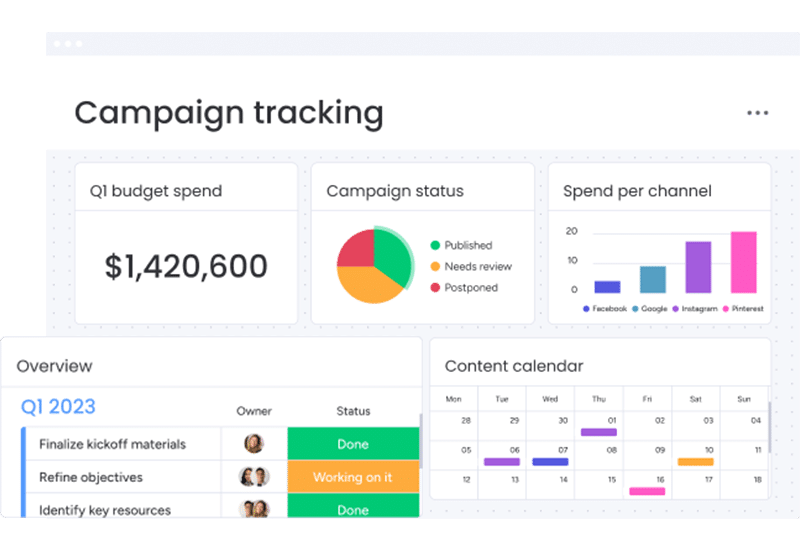
Post-Event Follow-Up and Analysis
The success of an event doesn’t end when the last attendee leaves. Effective post-event follow-up and analysis are crucial for understanding the event’s impact, gathering feedback, and planning future improvements. Knowing how to use monday.com for effective event marketing and management can help you streamline these processes, ensuring that you gain valuable insights and maintain engagement with your audience.
Collecting Feedback and Data
Gathering feedback from attendees and analysing data from your event are essential steps in the post-event process. monday.com provides tools to help you efficiently collect and manage this information.
- Surveys and Feedback Forms Integration
- Use monday.com forms to collect attendee feedback. Get the responses directly to a monday.com board to keep all feedback organised in one place.
- Analysing Event Success through Data Collected
- Track key performance indicators (KPIs) such as attendance rates, engagement levels, and satisfaction scores. Create a dashboard in monday.com to visualise this data, helping you quickly identify what worked well and what could be improved.
Reporting and Insights
Generating detailed reports and insights from your event data is crucial for understanding its overall success and planning for future events. monday.com’s reporting capabilities make this process straightforward and insightful.
- Generating Detailed Event Reports
- Use monday.com to compile comprehensive reports that cover all aspects of your event, from attendance figures to financial summaries. Customise these reports to highlight specific metrics and insights that are most relevant to your goals. Share these reports with stakeholders to provide a clear picture of the event’s performance.
- Identifying Areas for Improvement for Future Events
- Analyse the feedback and data collected to identify areas where your event could be improved. This might include aspects such as logistics, content, engagement strategies, or marketing efforts. Use monday.com to create action plans for addressing these areas in future events, assigning tasks to team members and setting deadlines for implementation.
By thoroughly analysing your event and gathering detailed insights, you can make data-driven decisions that enhance the quality and effectiveness of your future events.
Continuous Engagement and Relationship Building
Maintaining engagement with your attendees even after the event is essential for building long-term relationships and encouraging participation in future events.
- Follow-Up Communication
- Use monday.com to schedule and automate follow-up communications with your attendees. This can include thank-you emails, feedback requests, and information about upcoming events. Keeping the conversation going helps to reinforce the connections made during the event.
- Nurturing Leads and Opportunities
- Track interactions and follow-ups with attendees who expressed interest in your products or services. Use monday.com’s CRM features to manage these leads and ensure that they receive the appropriate follow-up, nurturing them into potential customers or partners.
In conclusion, effective post-event follow-up and analysis are crucial components of knowing how to use monday.com for effective event marketing and management. By leveraging monday.com’s extensive capabilities for feedback collection, data analysis, reporting, and continuous engagement, you can gain valuable insights, build stronger relationships with your audience, and improve the success of your future events. This comprehensive approach ensures that each event not only achieves its immediate goals but also contributes to long-term growth and success.
Conclusion
Mastering how to use monday.com for effective event marketing and management can transform the way you plan and execute events. From setting up a robust event management workflow to coordinating logistics, managing marketing campaigns, and conducting post-event analysis, monday.com offers a comprehensive solution that streamlines every aspect of event planning. By leveraging the powerful features and integrations of monday.com, you can ensure your events are well-organised, on budget, and highly successful.
Using monday.com enhances collaboration, provides real-time updates, and offers detailed insights, making it an indispensable tool for event managers. Whether you are planning a small workshop or a large conference, monday.com adapts to your needs, providing the flexibility and efficiency required for successful event management.
Try monday.com for Free
Are you ready to elevate your event marketing and management? Try out monday.com for free through our link here. Experience firsthand how this powerful platform can streamline your event planning and ensure your events run smoothly.
If you need help implementing monday.com to fit your specific needs, reach out to us at Omnitas below. As world-leading partners of monday.com, we have extensive knowledge and expertise in implementing the tool for various industries and purposes. Contact us today to ensure you get the most out of monday.com and make your next event a resounding success.
If you found this blog post useful, make sure to sign up for our monthly newsletter below. Stay in the loop regarding all things business efficiency and automation!


